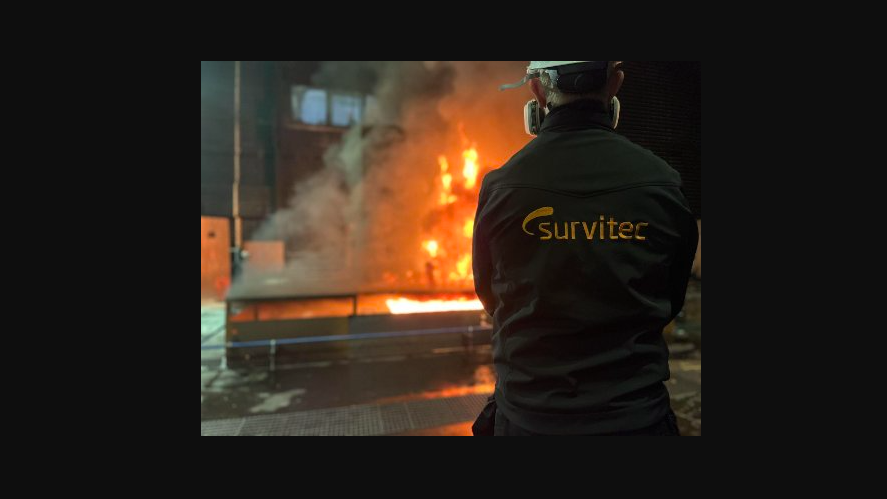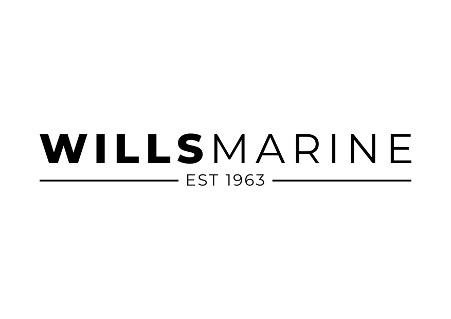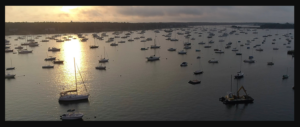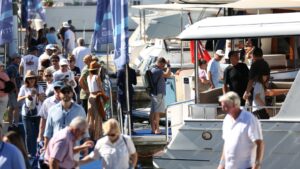Stark warning about fire safety on methanol-powered vessels

A new fire safety study by Survitec (survival technology) indicates that commonly used existing fire-fighting methods are inadequate when dealing with methanol-based fires.
“We are seeing a significant uptake in orders for methanol-fuelled vessels, with 2023 being the breakout year for this alternative marine fuel. With more methanol-powered ships being built every year, the industry must act now to prevent dangerous gaps in fire safety,” says Maciej Niescioruk, product manager, foam systems, Survitec.
MIN‘s been reporting on the growing numbers of methanol-powered vessels, like Genoa-based superyacht builder Tankoa’s new 70-metre superyacht and Archipelago zero.63 which design includes a direct-injection methanol engine, enabling the boat to reach a top speed of 22 knots.
The uptick in methanol will delight Stephen Weatherley Archipelago Expedition Yachts founder and MD, who last year told MIN the industry was being held back by competing fuels of the future. At that time, he said the “leisure industry only has two viable choices: battery, for short distance operations, and methanol for longer distance and higher speed operations.” And now, like lithium ion batteries before it (Ineos Britannia suffered damage to its training boat, Athena, after an electrical battery fire onboard this February), methanol is being placed under the microscope.
Survitec says it’s undertaken extensive comparative fire tests on dual-fuel marine engines using diesel oil (DO) and methanol, carried out amid growing interest in methanol as an alternative marine fuel. Its looked at equipment used to extinguish machinery space spray and pool fires (where fuel leaks may pool).
“Our tests confirm that traditional water mist fire suppression mechanisms do not perform as expected on methanol pool fires and methanol spray fires. A completely different approach is required if these ships are to remain safe.”
Michal Sadzynski
Methanol is a methyl alcohol (CH3OH) that burns in a completely different way than hydrocarbon fuels and has a much lower flashpoint of 12°C (54°F). However, while there are established fire safety regulations and testing standards for diesel fuels, clear test protocols for alcohol-based fuels such as methanol and ethanol have yet to be developed.
“We believe this is a high-risk situation that needs immediate action,” stresses Sadzynski, product manager, water mist systems, Survitec. “Methanol fires are far more aggressive than fires involving traditional hydrocarbon fuels. Methanol fires have different physicochemical properties and so they cannot be extinguished as easily or with the same approach.”
Tests show methanol fires have unique challenges
The Survitec tests found that while water mist systems are highly effective in absorbing heat and displacing oxygen on diesel fires, they do not produce the same results on methanol fires.
“We had to completely rethink nozzle placement, spacing and other factors to make water mist suppression effective on methanol. For instance, the range for nozzle installation height is much lower than that needed to put out a diesel fire,” he says.
This finding indicates that if existing vessels are retrofitted to run on methanol, they would need to overhaul and redesign their fixed fire-fighting arrangement completely.
For bilge areas, statutory rules formulated in IMO MSC.1/Circ.1621 establish a requirement for an approved alcohol-resistant foam system for ships running on methanol. For the first time, a fixed, low expansion foam system is mandatory under the rules when it comes to protecting machinery space bilges.
“Our tests demonstrate that standard discharge devices do not properly extinguish methanol pool fires in the confined bilge space. It is crucial to deliver properly expanded foam on the methanol pool fire and this is not an easy task within such a narrow space where throw length is limited,” says Niescioruk.
“MSC.1/Circ.1621 provides us with a starting guideline but it is very general and therefore open to interpretation. Moreover, methanol compliance for Local Application Firefighting (LAFF) systems is not yet covered. As an industry, we need to come together and develop comprehensive and robust fire test standards and safety rules tailored to methanol’s unique properties,” he says.
The stark conclusion of the investigation arrives at a time of increasing orders for methanol-fuelled ships. The greener fuel is seen as a panacea to meeting the industry’s emissions abatement targets, and forecasts predict accelerated adoption rates.
“We encourage all stakeholders to come together to address methanol’s unique fire risks and create clear standards, new testing protocols and updated safety rules for methanol.”
Maciej Niescioruk











